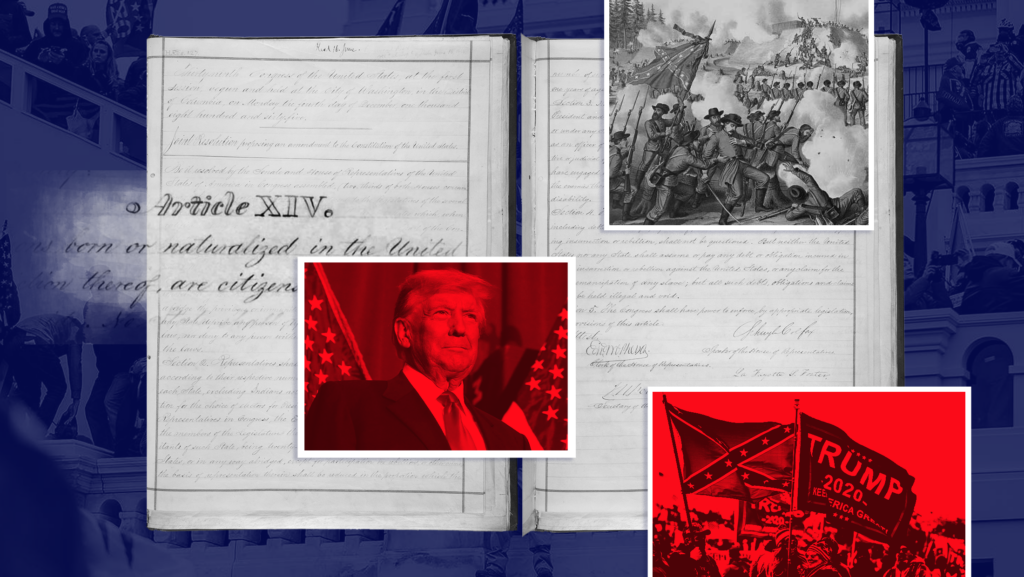The 14th Amendment’s Disqualification Clause Was Made for This Moment

Tomorrow, the U.S. Supreme Court takes up the Colorado Supreme Court’s decision that former President Donald Trump may not appear on the state’s primary ballot because he is constitutionally disqualified for having engaged in insurrection. The justices may well affirm that decision. Some find the idea of barring Trump from the ballot worrisome, raising questions of due process and democracy — concerns made more urgent as Trump emerges as the presumptive Republican presidential nominee.
It shouldn’t be worrisome. It’s the right decision legally and the right decision for democracy.
The Colorado Supreme Court reached its decision after a great deal of process, and worries that the decision was unfair because Trump did not receive due process are simply unfounded.
The trial judge ruled that Trump engaged in insurrection after a five-day-long evidentiary hearing, which included testimony from 15 witnesses, thousands of pages of documents and hours of video evidence. The witnesses included members of Congress, law enforcement, experts, government officials and organizers of the Jan. 6, 2021 rally.
There were hours of legal argument at the trial court and state Supreme Court, with all sides ably represented by top lawyers. Trump had the opportunity to present and cross-examine witnesses and evidence — and did. He had the opportunity to testify — and chose not to do so.
There was no shortage of process. Even more, a criminal conviction or indictment for insurrection is not a needed part of the process, because this is about qualification for office, not criminal punishment. This is exactly the kind of process (and a whole lot more, in fact) that is generally used to determine ballot qualification.
At least eight people have been formally adjudicated as disqualified under Section 3 of the 14th Amendment. Both immediately after the Civil War and recently, not a single one was convicted of, or even charged with, insurrection or substantially similar statutes. Disqualification is just different.
The other major argument is that taking Trump off the ballot is anti-democratic, and the people should be able to decide whether or not they want him to be president. That logic doesn’t hold either.
The Constitution has a provision to protect our democracy in exactly the situation in which we find ourselves right now. We need to use it.
The U.S. Constitution sets out the rules of our democracy. It is no more anti-democratic to say Trump can’t run because he engaged in insurrection than it is to say Zendaya can’t run because she is 27 or George W. Bush can’t run because he already served two terms.
In fact, this particular rule was put into place after the Civil War because the Framers of the 14th Amendment wanted to ensure that those who had attacked our republic and our democratic system could not be put in position to do it again. It is an expressly pro-democratic rule — and it is in fact the only qualification under a candidate’s own control. You can’t choose to be too young to run for president, but you can choose to incite an insurrection.
Finally, we already tried letting the people decide whether they wanted Trump to be president. They chose against him in 2020, but he refused to accept that result and instead incited a violent insurrection to try to stay in power. There is no reason to believe the same won’t happen again in 2024.
As Trump moves further down the path of securing the Republican nomination, the objections to removing him from the ballot grow. But it makes no sense to say the Constitution shouldn’t apply to a candidate who is popular and actually could win. Constitutional qualifications that are only applied to minor candidates with no chance of winning would be meaningless. Disqualification for thee, but not for me, if I am leading in the polls.
The Framers of the 14th Amendment expressly wanted to protect the republic from those who had attacked our democracy, but were popular and realistically could be elected again. It was exactly those candidates from whom the republic needed protecting. There aren’t different rules for the “popular,” and the rules would be of little use if there were.
The Constitution has a provision to protect our democracy in exactly the situation in which we find ourselves right now. We need to use it.
Noah Bookbinder is the president of Citizens for Responsibility and Ethics in Washington (CREW), which brought the 14th Amendment case against Trump on behalf of six Republican and unaffiliated Colorado voters.